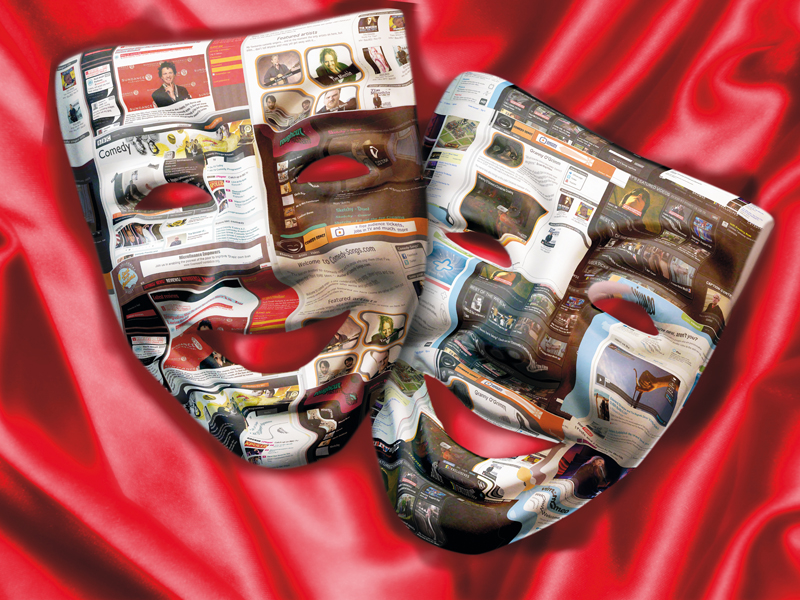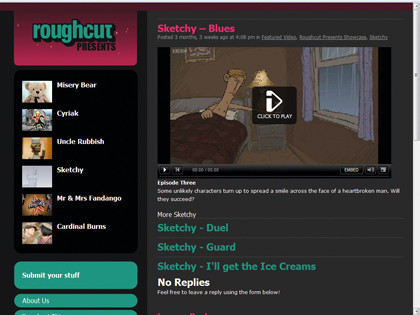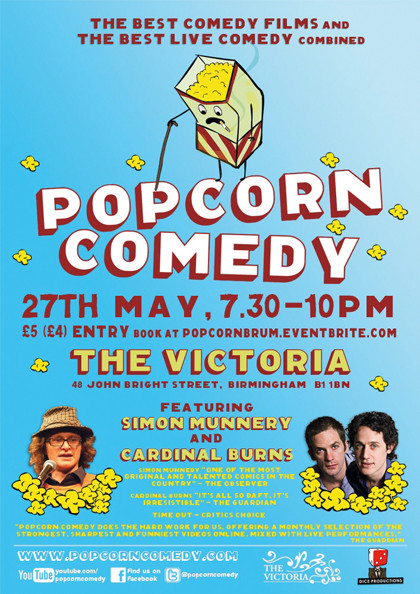How the web showcases bright new comedy stars
Offering up-and-coming acts a platform like never before

Sign up for breaking news, reviews, opinion, top tech deals, and more.
You are now subscribed
Your newsletter sign-up was successful
Back in the early '90s there was a popular saying that went, 'Comedy is the new rock and roll'. And it's true now, too!
There are just as many, if not more, wannabe practitioners of the comic arts today as there were then. Never before have new comedians been able to show off their work to so many people so fast, and it's all thanks to the internet.
Video websites like YouTube and the many dedicated comedy sites out there have created many stars (sometimes not always on purpose) just through contributors clicking an upload button. As the publicity power of viral emails, Facebook memes and Twitter trending topics has become apparent, more and more comedians are looking to the internet to launch them into the world of mega stardom.
Of course, it's not easy to know what will become popular or how to start out, so we decided to speak to some of the talented figures who have made the web work for them to see what tricks they used to achieve their dream.
Funny business
To start with, we tracked down Nat Saunders, one half of comedy duo Worm Hotel (the other is his writing partner Chris Hayward). They have already made a name for themselves writing sketches for programs such as Big Train and Smack the Pony, and are now using the internet to explore a new direction.
"We blindly started writing sketches and sitcom scripts together," Saunders explains, "not having a clue how any of it worked, but sending them off to names we found on the end credits of our favourite comedy programmes, and were lucky enough to get a break early on. The next few years were spent developing sitcoms and film scripts that, for one reason or another, never made it past the pilot stage. We were getting pretty narked with the knockbacks, and really wanted to perform too, so when the whole Web 2.0 thing happened we decided to learn how to write, produce, film and edit our own sketches and movies, with us in them.
Sign up for breaking news, reviews, opinion, top tech deals, and more.
"It's taken a few years to get the hang of it all," adds Saunders, "but now we're making the stuff we want to make, doing everything our way, getting commissions, and we're still able to write sitcoms and sketches for other people too. Which basically means we get about two hours' sleep a day."
So how much has the internet helped them in their careers? "For us, who always wanted to do more than just write, it's been the best thing ever," enthuses Saunders. "We simply wouldn't be able to do what we currently do. We'd just be writers, tapping away in our studies, watching other people make our stuff. Now we can show people our sketches, fully fleshed out, rather than try to dryly explain them on paper."
What advice do they have for anybody who is starting out using the internet to advertise their writing/performances? "Well, the first rule of web comedy is to keep it short," says Saunders. "Sketches need to make their point quickly, or people lose interest. Our earlier stuff was all around the five-minute mark – now we try to get everything below two. It's tricky, but it teaches you about honing your work, slicing the flab out.

"Then, get a YouTube channel and a Vimeo channel. Upload your skits and start sharing them on Twitter, sending them to the likes of BBC Comedy Extra, www.roughcutpresents.com or www.popcorncomedy.com – places where industry pros are on the lookout for emerging talent. Link them off sites like www.b3ta.com, comedy forums and your Facebook page, that kind of stuff.
"And pray. Pray your stuff isn't rubbish and that someone influential sees it and wants to know more about you. But, mainly, keep it short. The guy that taught me that, Jon Petrie at Popcorn, is a very wise man."
A wise man once said...
Taking this tip to heart, we spoke to the same very wise man, and found that comedy has been his bread and butter for a long time, giving him plenty of experience to draw on:
"I started out as a runner on Never Mind the Buzzcocks and have been lucky enough to work on shows such as QI, Comic Relief and The IT Crowd. I now work with Ash Atalla (producer of The Office and The IT Crowd) as Head of Online for Roughcut Presents. We work with talented film makers to produce material for the likes of the BBC and Channel 4."
Petrie is also the organiser behind Popcorn Comedy. He explains: "It's a comedy night and website that presents some of the strongest, sharpest and funniest videos online." In a strange reversal of the usual pattern, this is a case of internet culture spawning a live show.

"Our live nights feature the country's best stand-up and character comedians as they showcase their own short comedy films. I started the night with comedian Holly Walsh because we felt that there wasn't anywhere for comedians making films to show their work to an audience and get constructive feedback, rather than the useless 'LOL' and 'That was crap' comments that you'd most likely get from viewers on YouTube."
Since its launch, the comedy night has gained a lot of fans and attracted a large range of impressive talent. Petrie elaborated further: "One of the actors from Spinal Tap (Michael McKean) sent us an email to say what a great idea he thought Popcorn Comedy was, which was very cool. We've been very lucky to have live appearances from Peter Serafinowicz, David Cross, Graham Linehan and Adam Buxton at our live shows as well."
There's no doubt that Petrie believes the internet is a very important part in a comedy performer's armoury: "Comedians are now able to bring an idea to life in more ways than has ever been possible before. They can collaborate more easily with animators and programmers who can enhance their comedy films, and they can try out ideas without industry people telling them that they don't think it's funny.
"We now have a situation where comedians can find an audience for their work on their own without having to go cap-in-hand to industry people. Technology is getting cheaper and easier to use. It's very exciting."
If you want to try it yourself, what would Petrie suggest? "Do it! There's nothing to lose and everything to gain. A good tip for ensuring what you're uploading is funny is to ask people who aren't attached to you or the idea to watch it and see if they think it's funny. When you've spent so long filming and editing something, you'll begin to lose sight of where the jokes were in the first place. It's important to be critical of yourself, because if you're not, everyone else will be. Finally, keep it short! People on the internet have awful attention spans. Use the 'YouTube Insights' tool to work out where viewers are switching off – that might give some useful clues."
- 1
- 2
Current page: Taking your comedy online: keep it short!
Next Page Taking your comedy online: spreading the word